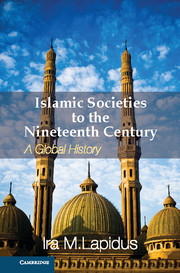Book contents
- Frontmatter
- Contents
- List of Illustrations
- List of Figures
- List of Maps
- List of Tables
- Preface
- Acknowledgments
- Acknowledgments to the first edition of A History of Islamic Societies
- Acknowledgments to the second edition of A History of Islamic Societies
- Publisher's Preface
- Introduction to Islamic Societies
- Part I The Beginnings of Islamic Civilizations
- The Middle East from c. 600 TO c. 1000
- The Preaching of Islam
- The Arab-Muslim Imperium (632–945)
- Cosmopolitan Islam: The Islam of The Imperial Elite
- Urban Islam: The Islam of Scholars and Holy Men
- Chapter 14 Introduction
- Chapter 15 Sunni Islam
- Chapter 16 Shiʿi Islam
- Women, Families, and Communities
- Part II From Islamic Community to Islamic Society
- Part III The Global Expansion of Islam from the Seventh to the Nineteenth Centuries
- Glossary
- Bibliography
- Annotated Bibliography from A History of Islamic Societies, 2nd Edition
- Index
Chapter 15 - Sunni Islam
Published online by Cambridge University Press: 05 February 2013
- Frontmatter
- Contents
- List of Illustrations
- List of Figures
- List of Maps
- List of Tables
- Preface
- Acknowledgments
- Acknowledgments to the first edition of A History of Islamic Societies
- Acknowledgments to the second edition of A History of Islamic Societies
- Publisher's Preface
- Introduction to Islamic Societies
- Part I The Beginnings of Islamic Civilizations
- The Middle East from c. 600 TO c. 1000
- The Preaching of Islam
- The Arab-Muslim Imperium (632–945)
- Cosmopolitan Islam: The Islam of The Imperial Elite
- Urban Islam: The Islam of Scholars and Holy Men
- Chapter 14 Introduction
- Chapter 15 Sunni Islam
- Chapter 16 Shiʿi Islam
- Women, Families, and Communities
- Part II From Islamic Community to Islamic Society
- Part III The Global Expansion of Islam from the Seventh to the Nineteenth Centuries
- Glossary
- Bibliography
- Annotated Bibliography from A History of Islamic Societies, 2nd Edition
- Index
Summary
In the century following the founding of Basra, Kufa, and other Arab-Muslim cities, Arabic literary interests were pursued in conjunction with Quranic, legal, theological, and other religious subjects. An Arabic lingua franca emerged for the diverse tribes. Persian and Aramaic speakers contributed to rapid changes in Arabic's vocabulary, grammar, style, and syntax. As the Arabic language changed, religious scholars feared that they would lose touch with the Arabic of the Quran and thus lose the meaning of God's revelations. In eighth-century Basra, philosophical, lexicographical, and grammatical studies were undertaken to recapture the pure Arabic of Mecca and of the desert tribes and to clarify the usage of Arabic in the Quran and hadith. The roots of words had to be specified, vocabulary selected and explained, and proper speech given rules of grammar and syntax. These linguistic efforts persisted for more than a century and produced what we now know as classical Arabic. The grammar of Sibawayhi (d. 796) and the early dictionaries of Arabic were the products of this period.
The cultural ramifications of these studies went beyond linguistic analysis. The basis of linguistic studies was the collection of examples of old Arabic. Much in the manner of contemporary linguists or anthropologists, the scholars of Basra and Kufa sought out the bedouins and recorded their poems and sayings. Gradually, a large body of lore was accumulated and transcribed from oral into written form. This lore included bedouin poetry, as well as information about the life of the Prophet, Quranic revelations, the early conquests, and the behavior of the early leaders of the Muslim community. From the eighth to the tenth centuries, the totality of this literary and religious culture was gathered into several encyclopedic collections. Arabic literary culture was not purely the heritage of the desert but was shaped in the early Islamic era out of the religious and historical concerns of the Umayyad and early ʿAbbasid periods.
- Type
- Chapter
- Information
- Islamic Societies to the Nineteenth CenturyA Global History, pp. 146 - 173Publisher: Cambridge University PressPrint publication year: 2012



